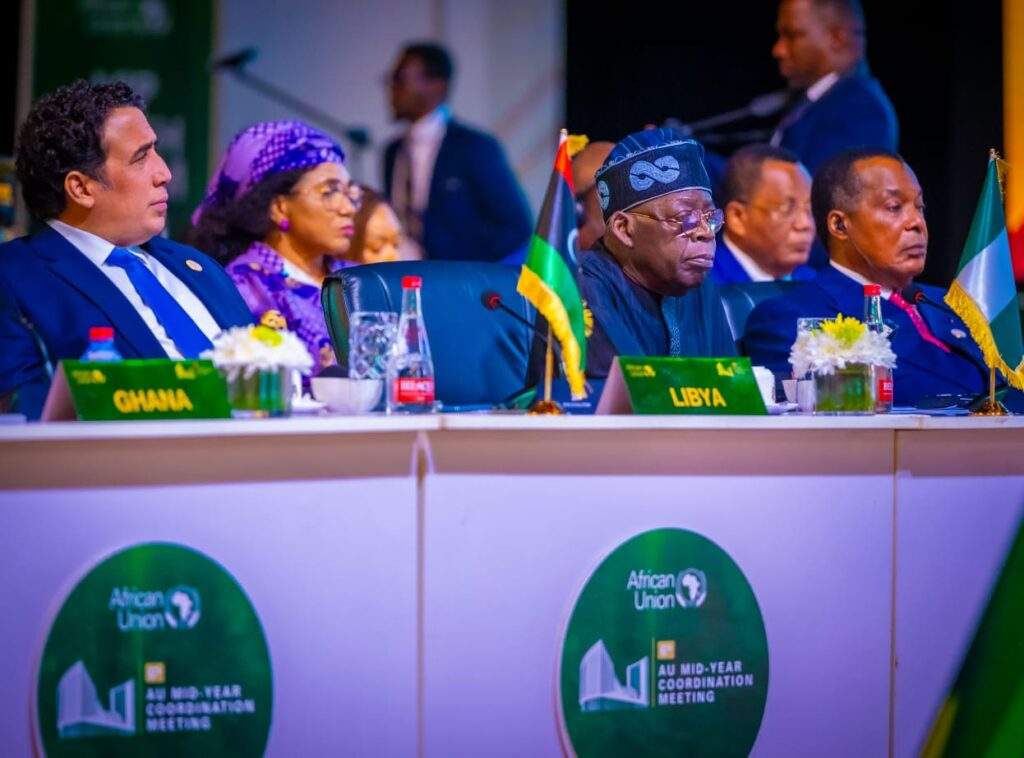ECOWAS Makes Progress, Confronts Challenges
Accra, Ghana – President Bola Tinubu of Nigeria has highlighted the progress made by the Economic Community of West African States (ECOWAS) in the past year, while also acknowledging the prevailing challenges facing the region.
Speaking at the Sixth Mid-Year Coordination Meeting of the African Union (AU) in Accra, Ghana, Tinubu, who is the Chairman of the ECOWAS Authority of Heads of State and Government, said the Community had activated a Standby Force to counter terrorism and would continue to explore funding options.
Tinubu emphasized that ECOWAS had been supporting member states to enhance electoral and governance processes, with the recent deployment of Election Observation Missions to Senegal and Togo, which were both deemed peaceful, transparent, and fair.
He also highlighted the facilitation of the signing of an Agreement for National Unity in Sierra Leone and the ongoing consultations to revise the ECOWAS 2001 Supplementary Protocol on Democracy and Good Governance.
In the area of economic integration, Tinubu stated that ECOWAS had implemented activities to consolidate the free trade area, customs union, and common market. The Community had also supported six member states in ratifying the WTO Fisheries Subsidies Agreement and 13 member states in ratifying the AFCFTA agreement.
ECOWAS had also allocated $9 million to assist persons of concern, including refugees, internally displaced persons, and asylum seekers, and had provided support to frontline member states in the fight against terrorism.
On the humanitarian and social development front, Tinubu said ECOWAS had established the West African Network of National Academies of Sciences and the African Forum for Research and Innovation, and had continued to provide support to women with obstetric fistula, empowered women entrepreneurs in agribusiness, and focused on gender equality in education and the green economy.
In the area of energy, mines, and agriculture, Tinubu said ECOWAS was advancing electrification efforts in The Gambia, Guinea Bissau, and Mali through the ECOWAS-Regional Electricity Access Project, and had approved 32 Solar Off Grid SMEs, including nine SMEs led by women.
He also mentioned that ECOWAS had provided support to its members in the implementation of the Paris Agreement and the establishment of a regional carbon market, and had developed a Regional Food Security strategy to achieve self-sufficiency in rice production.
Despite the progress made, Tinubu acknowledged that ECOWAS faced multiple threats, including member states withdrawing, geopolitical rivalries, terrorism, food insecurity, climate change, and the spread of misinformation and disinformation. He said the bloc would continue to dialogue with Burkina Faso, Mali, and Niger to maintain unity and would convene a Special Extra-ordinary Summit on the future of the Community.
Tinubu also reported that the ECOWAS Commission had assumed the rotating Chairmanship of the Inter-REC platform since February and had hosted the East African Community (EAC) and the Intergovernmental Authority on Development (IGAD) to exchange views on various issues and review best practices.
The meeting was convened under the AU theme on Education, "Educate and Skill Africa for the 21st Century," and was attended by the Chairpersons of RECs, the AU Commission, and Regional Mechanisms (RMs).
